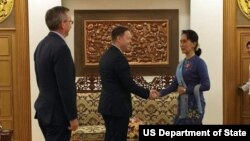Senior Director for Asian Affairs at the White House National Security Council Matt Pottinger, visited Myanmar June 14-16 to meet with senior government leaders and civil society to discuss and strengthen U.S.-Myanmar bilateral relationship.
The United States is concerned about the intensifying conflicts in the northeastern part of Myanmar, particularly Kachin and Shan States, the crisis in Rakhine State, and the production and flow of narcotics. These are huge challenges, and making progress is critical for Myanmar’s success overall.
The Rakhine crisis in particular has created an enormous humanitarian crisis and poses challenges for the entire region. The United States has been critical at times, but remains committed as a friend to help Myanmar resolve the crisis in Rakhine State and the many challenges Myanmar faces.
U.S. policy towards Myanmar is part of a broader U.S. policy in the region to support a free and open Indo-Pacific, which is important for all to succeed and prosper. In a free and open Indo-Pacific, countries are free from coercion and are able to protect their sovereignty and territorial integrity; societies have good governance and respect for fundamental human rights and liberties, and all nations share a commitment to the peaceful resolution of disputes. ASEAN plays a vital role in promoting a rules-based order in the Indo-Pacific.
The U.S. seeks to partner with all who respect national sovereignty, fair and reciprocal trade, and the rule of law.
U.S. assistance of approximately $120 million last year supported a peaceful, democratic, and increasingly prosperous Myanmar.
The U.S. works directly with farmers, businesses, banks, and other institutions to help all people in Myanmar benefit from economic growth. We also work with the Ministry of Health and Sports and with local organizations to improve health systems.
The United States helps Myanmar to build democratic institutions that serve and provide essential services and build the skills of local leaders so they can contribute to peace and reduce conflict across Myanmar.
The U.S. government also provides assistance and technical training for law enforcement and justice institutions, and for education.
For decades, U.S.-Myanmar relations have been based on U.S. support for peace, freedoms, and democratic reforms in Myanmar. The United States is committed to see a Myanmar that is peaceful, democratic, and increasingly prosperous. That’s good for Myanmar, and good for the United States.






